(1991) Written and directed by Jean-Pierre Jeunet and Marc Caro; Starring: Marie-Laure Dougnac, Dominique Pinon, Jean-Claude Dreyfus, Karin Viard, Ticky Holgado, Silvie Laguna and Rufus; Available on Blu-ray and DVD
Rating: ****
What would the world be like after a cataclysmic event? Would governments and infrastructure crumble, with people lapsing into anarchy, or would we somehow shamble on, as if nothing ever changed? Delicatessen, the auspicious feature film debut of writing/directing duo Jean-Pierre Jeunet and Marc Caro, leans toward the latter. The filmmakers arrived with a bang, establishing their signature combination of colorful characters, swooping visuals and whimsical situations, amidst a post-apocalyptic milieu.
Delicatessen doesn’t waste time establishing how the world got into this sorry state. Judging from the murky, ochre-colored air and scarcity of food, it’s a safe bet that it was a perfect storm of environmental/economic events that brought humanity to the brink. Money, as well as food,* is scarce, leading to a reprisal of the barter system. When we’re introduced to Louison (Dominique Pinon), he’s forced to pay his taxi fare with his shoes. Answering a want ad for a handyman (to replace the previous one, who vanished under mysterious circumstances), he arrives at a tenement house. He meets Clapet (Jean-Claude Dreyfus), king of his private fiefdom as butcher/landlord, determining who stays and who ends up on tomorrow’s dinner table. It’s only a matter of time before Louison befalls the same fate as his predecessor, but he finds a new ally from an unlikely place. Meanwhile, an underground (literally) resistance is brewing in the labyrinthine sewers beneath the city.
* Fun Fact #1: In his DVD commentary, Jeunet pointed out that most of the images that appear on the tenants’ TVs are food, something that would be in short supply.
The tenants consist of an odd, colorful assortment of individuals. Louison, an ex-circus performer, continues to practice his tricks. In a small workshop, two men manufacture little mooing and bleating cans that mimic farm animals (it’s never established whom these are intended for). Potin (Howard Vernon), an elderly man, lives in a damp, swamp-like room, filled to the brim with frogs and snails. Aurore Interligator (Silvie Laguna), hears voices that provoke her into increasingly elaborate suicide attempts. Underneath the streets, the Troglodists (including co-director Caro)* emerge at night to raid food and supplies.
* Fun Fact #2: The Troglodists’ underground lair was filmed, in part, in the (closed to the public) Saint-Fargeau reservoir in Paris, a vast underground waterway built in the 19th century.
Clapet’s nearsighted daughter, Julie (Marie-Laure Dougnac), falls for the new lodger, although we discover (through a heated exchange with her father), it’s not the first time she’s been enamored of the handymen. This time is different, however, as she’s determined not to allow Louison to wind up as meat in her father’s shop. They simply click together, as illustrated in one charming scene, where Julie and Louison perform a duet on the cello and musical saw, respectively. Pinon’s (a favorite of Jeunet and Caro) distinctive facial features complement Dougnac’s expressive eyes, a fittingly eccentric pair in a strange world.
Jeunet and Caro’s stock in trade are the numerous sight gags, big and small which distinguish their movies from other filmmakers. Among their depictions of Rube Goldberg-style chain of events, there’s one to top them all (often emulated, but never improved upon). Arguably Delicatessen’s most memorable scene consisting of a series of meticulously edited sequences, depicts shots of the denizens engaged in various activities (painting, beating a rug, a cello playing, and a metronome ticking) in rhythm to the sounds of squeaky mattress springs. In another scene (which Caro emulated from a Laurel and Hardy film), a bathroom fills up with water from floor to ceiling (I suspect the sequence will also look familiar to those acquainted to a similar scene in Guillermo del Toro’s The Shape of Water).
The film owes its unique look, thanks in no small part to cinematographer Darius Khondji (who also collaborated with Jeunet and Caro on The City of Lost Children). With his fly-on-the-wall perspectives, we are an active participant in the world of Delicatessen. We’re invited to take in the little details peppered throughout, especially in the opening credits sequence. The overall appearance is enhanced through a film process called ENR, which, according to Jeunet, “highlights contrasts and desaturates colors.” The end result is an emphasis on red and green, bathed in gold.
* Fun Fact #3: ENR stands for “Ernesto Novelli Rimo,” named after the color technician who developed the process for filmmaker Bernardo Bertolucci.
Delicatessen is a post-apocalyptic tale like no other,
asking us not to bother speculating too much about the logic of the world that
Jeunet and Caro built, but to accept the reality of the moment. It’s not about
elaborate plots or exhausting action sequences. Instead, it’s a study of quirky
individuals, stretched to the breaking point (and when the going gets tough,
the tough get silly). Above all, Delicatessen reminds us that love
endures, even amidst the bleakest of circumstances, and there’s always time for
laughter and enjoyment. Even at its darkest, life is worth it for those
fleeting moments of joy. If you’re looking for obsidian-dark humor with a whimsical
touch, Delicatessen will most assuredly scratch that itch.

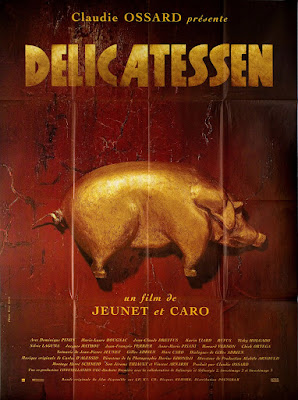
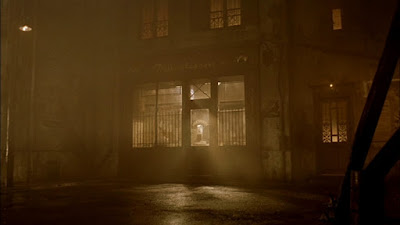
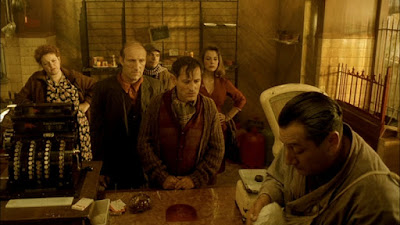

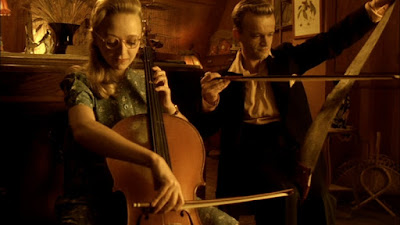


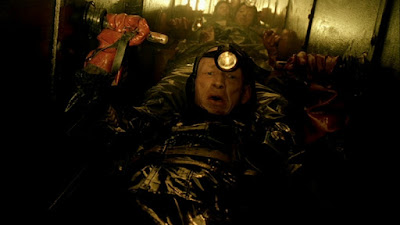
Intriguing review, Barry!
ReplyDeleteI've heard of this one, but haven't seen it.
Sounds wonderfully odd!
Thanks, John! Wonderfully odd is right! It's such a visually inventive, absurdist treat.
DeleteIt's been a long time since I've seen this, but as you note, the "symphony" of the bed springs, the cello, and all the other mundane things that the tenants are doing is unforgettable! I see this is on Prime, so I'm excited about getting reacquainted. Great pick and great review!
ReplyDeleteThank you very much, Brian! Glad to hear it's on Prime. Enjoy!
Delete